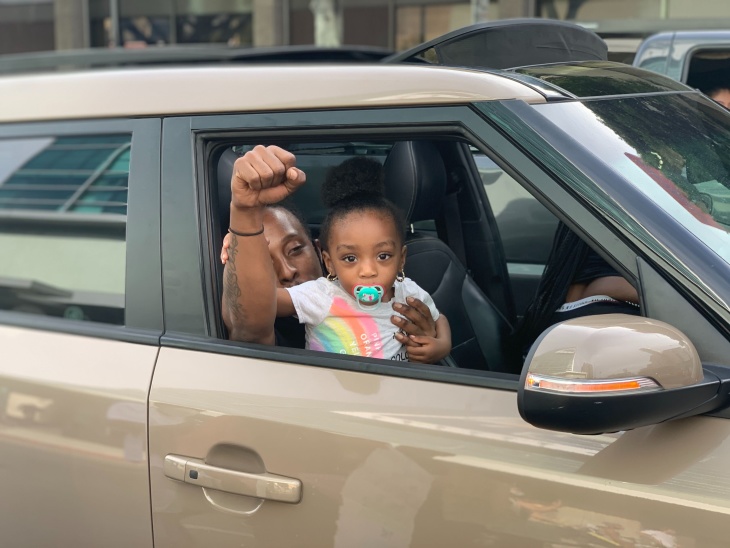
Our news is free on LAist. To make sure you get our coverage: Sign up for our daily newsletters. To support our non-profit public service journalism: Donate Now.
At the start of the coronavirus we offered advice on how to talk to your littlest kids about the pandemic.
Now there are more crises to discuss — and it would be totally ridiculous if I told you there's an easy way to explain to your kids what's happening in the world right now.
But there are thoughtful people who have something to say about how parents might acknowledge and discuss the topics underlying this week's nationwide protests — such as racism and social justice — while continuing to create joyful moments within their families.
"I think parents put a lot of pressure on themselves to have all the answers. And we don't," Monyeé says. "This is a situation that we're going to have to co-create our way through with our children."
LETTING YOUR KIDS LEAD
Monyeé says don't dismiss kids' questions and statements as cute or oversimplified. Use them to start a conversation.
For example, if they say, "People should just get along."
You can say, You're absolutely right, but what happens when people don't get along? And listen to what your child says.
No matter what background families come from, Coleman-Mortley says there's a common foundation for these conversations:
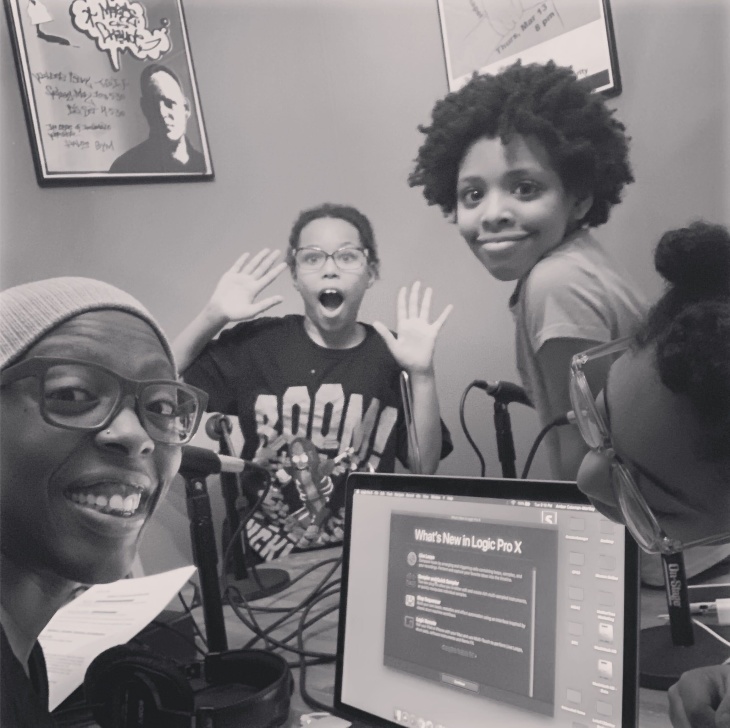
"All families want their kids to experience safety, love, security, belonging, right? Feel respected."
But families who aren't black have to think beyond their experiences to empathize with the experiences of their African American co-workers, neighbors, teammates, classmates and friends.
'You have to think, How am I being an advocate for making their life better?" Coleman-Mortley said. "What am I doing to support them?"
WAITING UNTIL YOUR KIDS ARE OLDER TO TALK ABOUT RACE IS A LUXURY
Coleman-Mortley knows when her daughters — who are 12, 11 and 9-years-old — watch footage on social media, they are going to see race and racism reflected in those videos.
"We always have conversations about race because our identity is an important part of who we are," Coleman-Mortley says. "We can't get around that, right? Like, we can't not be ourselves."
You can hear more from Coleman-Mortley on KPCC's Take Two.
Tunette Powell's son was suspended from preschool five times at three-years-old. Nationwide, black children are more likely than students of other races to be disciplined throughout their K-12 education.
"I told myself, OK, you get yourself out of poverty. You put your kids in the best schools. You're married. You're in a two-parent home. You live in a nice community," Powell said. "You tell yourself still that somehow those things will matter, they'll mean something, and they will save your kids from what you experienced ... You can't out-accomplish what's happening in this world."
Powell approaches her kids' questions with honesty and a level of complexity based on their age.
When her five-year-old son asked, "Are police bad?," she knew he'd take her answer as specific to the law enforcement officers they see in their community and that it wasn't the right time to talk about policing as part of a larger system or institution.
"I do think that there's something to be said about letting them know that not every police officer is good," Powell said.
FEELING ALL YOUR FEELINGS
Little kids have feelings, but they don't always have the words to describe them. That's where grown-ups come in.
Ask kids to act out their feelings and describe where they feel it in their body and then fill in the words that identify the feeling.
"I always tell people, 'Go beyond, like, happy, sad, mad,'" Monyeé said. "Frustrated is different than mad. Agitated is different. Annoyed is different."
(Here's a helpful list of feelings words from the University of California, Santa Barbara.)
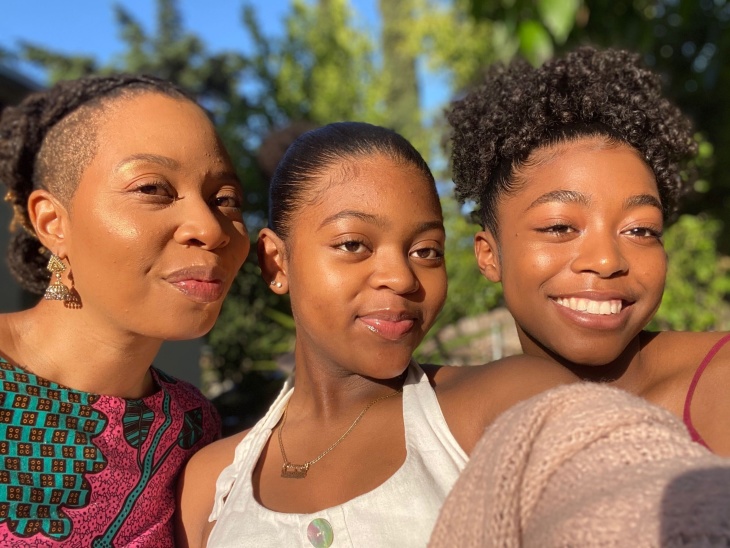
Monyeé says parents can share their own feelings with kids, even if they're complicated.
"I can hold joy in my body for when I see protesters kneeling together in silence with their fists up in the air. That brings me great joy," Monyeé said. "And I can also hold sadness for a business owner whose property was damaged."
Giving yourself permission to carry more than one emotion shows your family it's OK.
For Monyeé's family right now, this means attending rallies and planning their first family awards ceremony, with secret ballots and trophies for categories such as Best Cook, Most Weird and Funniest.
CREATING A 'FREEDOM DREAM'
"Black people have not only come together around a struggle, they've also come together around this idea that there was something better," Powell said. "That there was something more that we wanted."
It's an idea from UCLA professor and historian Robin Kelley, who wrote the book "Freedom Dreams," which he describes as "a history of the collective imagination of black radical social movements during the 20th century."
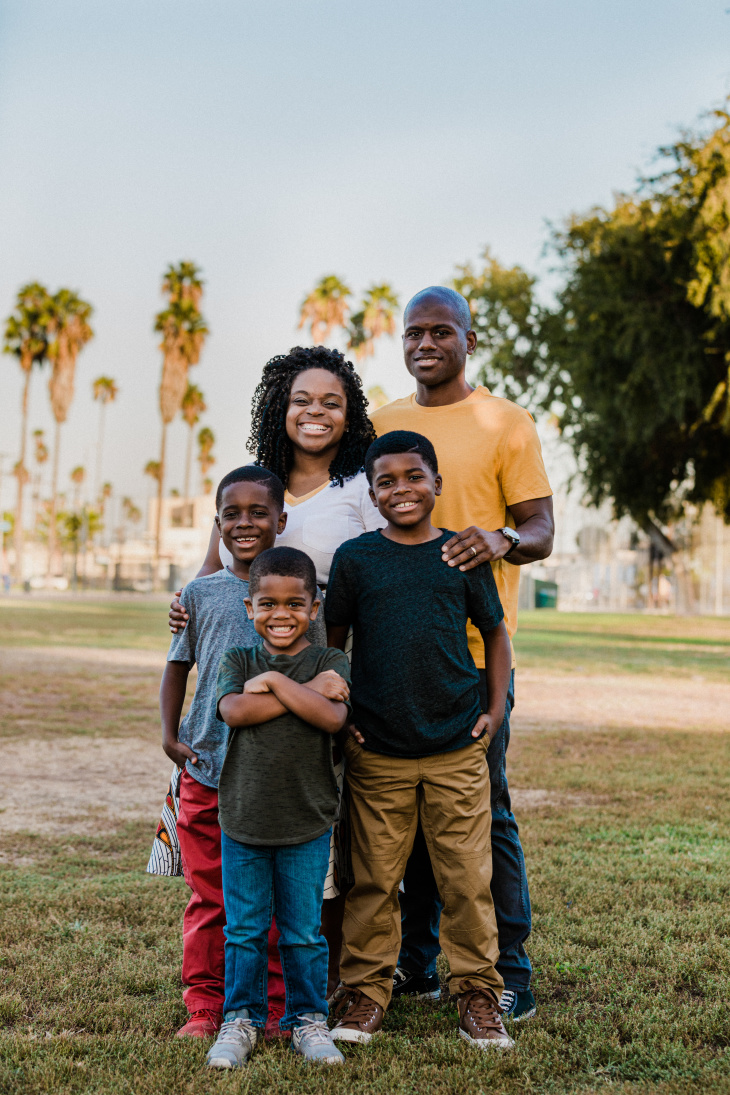
Powell turned this "super academic" concept into an opportunity for her kids to imagine their own futures with words, though a freedom dream can be expressed in any medium.
Powell recorded her sons' aspirations in a series of videos.
Her five-year-old, Jordan, sees himself 20 years from now running marathons in Mexico, driving a Lamborghini with two dogs — a pair of English bulldogs named Cody and Dody.
His nine-year-old brother, Joah, wants to be a wrestler. He imagines the world this way: "It has water. It has love. It has a lot of things. It's so good to live here. I love how we have all sorts of animals, my favorite dog and lizards."
Joah folds his arm and bows at the end.
JJ, 10, imagines "being able to break out of a shell, not just going under someone else's commands."
He added: "The collective freedom dreams for the world and for the country, it would be no more police brutality, giving money to people who don't have money, more school funds and just more nurses at school, libraries, like all of that."
Powell hopes her boys look back on these dreams with joy and fulfillment.
"Wherever you're from," said Powell, "there is a freedom in being able to think about a future that is better for all of us."
STARTING A GARDEN (HOUSEPLANTS ARE OK TOO)
"Right now, what makes people feel good — particularly children — is to take care of things," Monyeé said, whether it's an outdoor garden or a potted plant indoors.
Compton's Moonwater Farms is inviting families to visit the property, "breathe, refuge, place your hands in the soil."
"Giving them a sense of responsibility gives them a sense of control at this time and can make them feel more confident because confidence is something that we're all kind of struggling with right now," Monyeé said.
For Joy Hepp's three-year-old daughter, Esperanza, spending time outside under an avocado tree, picking lemons for lemonade and sprinkling seeds on the ground, connects her to a larger family history.
Her maternal great-grandmother was a California farmworker. Her paternal grandmother, who the family currently lives with in Altadena, is from Haiti.
"As a child with multiple histories in her blood, making sure that she has an appreciation for all of them and a reverence for where she came from has always been at the forefront for us," Hepp said. "And I found that through working with our hands in the dirt, there's really a throughline."
Hepp, her husband, his mother and her husband's brother have spent the past few months together at his mother's Altadena home.
"We're spending so much time [outdoors]," Hepps said. "We literally sat on the curb outside and watched butterflies go by for half an hour."
TEACHING KIDS WHAT PEOPLE ARE STANDING UP FOR
Liz Stauffer and her husband asked their four-year-old daughter if she wanted to attend a protest near their Agoura Hills home last weekend.
"We told her that there's hate, and people are mean to people of different colors and we don't accept that," Stauffer said. "And I said, 'Do you want to go see what people are standing up for?'"
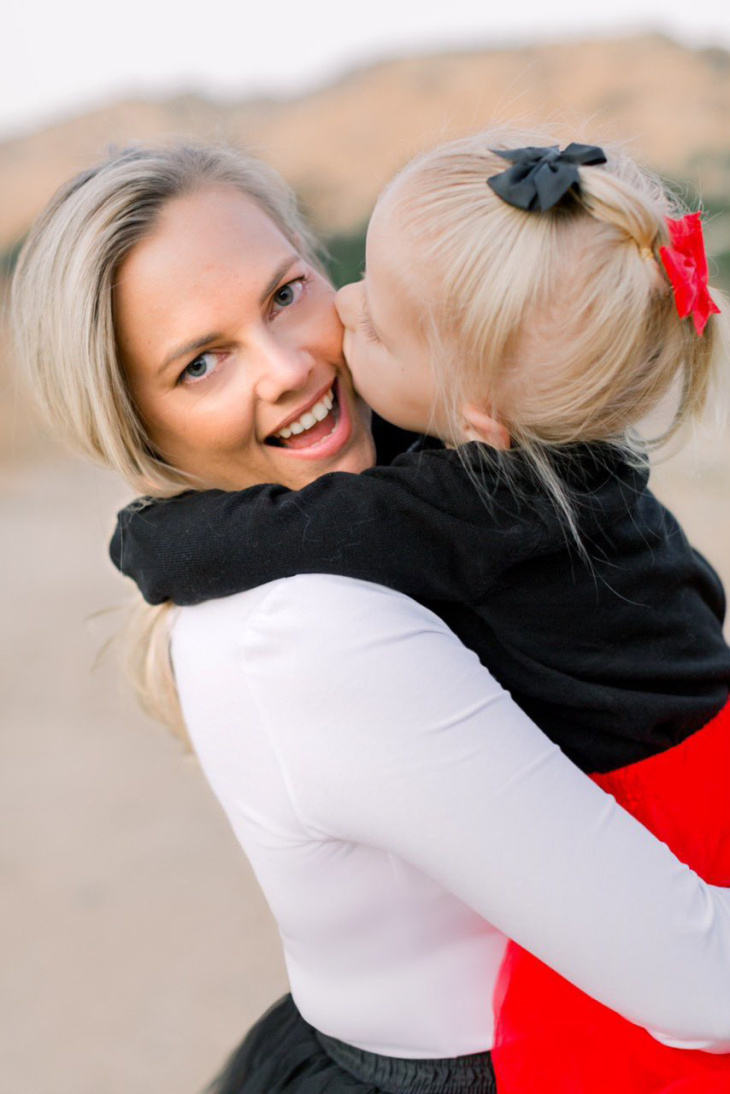
So they drove and watched from the car "because COVID scares the hell out of me," Stauffer said. Still, her daughter got to see and talk to the people gathered.
"I think the main approach we've taken with our child is I don't want her to be color blind," Stauffer said. "I want her to recognize colors, and know that we love everybody. We love every color and we recognize that people of different races have different struggles."
These conversations are sometimes related to books they read as a family, such as Little Leaders: Bold Women in Black History and Last Stop On Market Street.
Stauffer's daughter sometimes accompanies her while she works for the nonprofit Natasha Watley Foundation, which describes its work as creating "opportunities for girls in under-served communities to learn and play the game of softball."
And Stauffer is thinking about how to explain white privilege to her daughter.
"White privilege doesn't mean her life isn't going to be hard, but I want her to recognize that it's not going to be hard because of her skin.
"And we're going to show her as she gets older, give her the tools that she needs to use that privilege to hopefully make an impact and make change and continue to stand up for what is right."
RESOURCES:
From Tunette Powell:
From Thea Monyeé:
ADDITIONAL RESOURCES:
KPCC's Olivia Richard contributed to these resources.
"right" - Google News
June 03, 2020 at 06:53AM
https://ift.tt/2Ay9TRC
Even Young Children Notice What's Happening In The World Right Now. Here's What You Can Do To Help Them Understand - LAist
"right" - Google News
https://ift.tt/32Okh02
Bagikan Berita Ini














0 Response to "Even Young Children Notice What's Happening In The World Right Now. Here's What You Can Do To Help Them Understand - LAist"
Post a Comment